When you want to buy a domain name, you can register a brand new one through companies like GoDaddy, Namecheap, or Hostinger. These providers also offer web hosting packages, ensuring a complete setup for your website.
Another option is to buy a domain name already owned by someone else. This may cost more and be harder. You must negotiate with the current owner to settle on a price before transferring the domain name to yourself.
This guide will discuss how to choose and buy a domain name in 6 steps, the best places to get one, and how to perform a domain name search.
- Selecting the best domain name is a process that includes finding a reliable registrar, picking out your preferred domain, choosing the right option, completing the purchase, securing ownership, and verifying that the domain is entirely yours
- The differences between popular domain sellers such as GoDaddy and Namecheap highlight the importance of making an informed choice
- It’s possible to get a free custom domain, and you can secure a domain for up to ten years
- Linking your newly acquired domain to a hosting service sets the stage for your website’s launch
How to Buy a Domain Name for a Website in 6 Practical Steps
There are a few domain name registration steps to follow for your website. Let’s go through them:
1. Choose a Reliable Domain Registrar
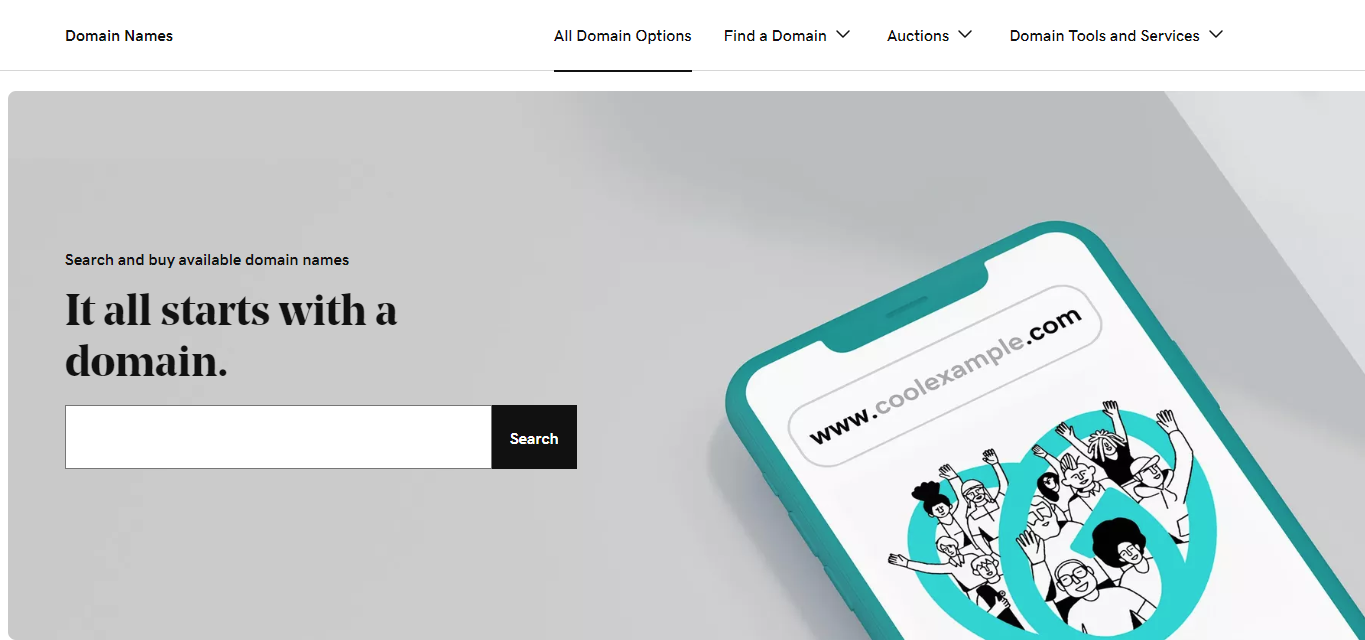
Source: GoDaddy.com
Choose a domain registrar carefully because it affects how easily you can manage your website name. Trust a known registrar like GoDaddy or Hostinger to give you a reliable place to manage your domain.
Make sure they offer services to protect your private details. This keeps your personal info safe from being misused.
Also, do your homework well and look at what other customers say about them to help you pick the registrar that fits what you want.
Here’s what you should consider when choosing a realiabe domain registrar:
| ICANN Accreditation | This accreditation is a sign of legitimacy and compliance with industry standards |
| Reputation and Reliability | Look for reviews, ratings, and testimonials to gauge their reliability and customer service quality. |
| Transparent Pricing | Some registrars may offer low introductory prices but have higher renewal rates. Also, check for any hidden fees. |
| Domain Transfer Policy | A good registrar should allow easy and free (or reasonably priced) transfers. |
| Customer Support | Reliable registrars provide timely and helpful support through various channels like phone, email, and live chat. |
| User-Friendly Management Interface | Registrars should offer an easy-to-use control panel for managing your domain, including DNS settings, renewals, and privacy options. |
| Expiration Policies | Some offer grace periods or auto-renewal options, which can be beneficial. |
| Security & Privacy Features | Assess the security measures in place, such as two-factor authentication and domain locking, which prevent unauthorized domain transfers. |
2. Use a Domain Name Search to Find Available Domain Names
Domain name search tools inform you if your first choice is already taken but also suggest domain names that might be available.
Examples of tools include:
- Registrars like GoDaddy or Bluehost offer free domain name availability search tools
- ICANN’s WHOIS Lookup
- Third-party tools like Domain Wheel, Domainr, and Looka
Keeping a few backup names in mind can facilitate the registration process, enabling you to secure a suitable domain name without unnecessary delays.
3. Choose the Best Domain Name Option
Select the right domain name to build a solid online presence. Make sure it matches your website’s content or business for a consistent and recognizable brand.
Choose a short, catchy, memorable name to help people find and remember your website. Stay away from names that look or sound like other brands to avoid legal trouble.
Also, consider different domain extensions. While .com is the most popular, other extensions like .net, .org, or industry-specific ones like .tech or .blog might be available or more suitable for your needs.
If your choosen domain name is not available, don’t worry, you can still buy a domain name that is already taken.
4. Buy Your Website Domain Name
Once you find an available domain, proceed to register it. You’ll need to provide contact information and register the domain for a set period, typically one year, with the option to renew later.
Learn more about how to register a domain name.
It’s important to carefully review the extra costs, such as domain privacy or other add-on services, to ensure transparency in your purchase.
Also, check whether the registrar offers comprehensive packages that include web hosting services, especially if you’re in the early stages of establishing your online presence.
5. Consider Domain Privacy Protection
Domain privacy protection is an additional service offered by most domain registrars to safeguard your personal information.
When you register a domain, your personal details like name, address, email, and phone number are required and typically stored in the public WHOIS database.
This database is accessible to anyone on the internet, which can lead to privacy concerns.
Here’s more on why and how domain privacy protection is important:
- Protection of Personal Information—Domain privacy protection replaces your information with the information of a proxy service, thus keeping your details hidden.
- Reduces Spam and Unsolicited Contacts—Privacy protection helps in reducing spam emails, unsolicited offers, and even scam attempts.
- Prevents Domain-Related Fraud—By keeping your information private, you reduce the risk of identity theft and domain hijacking, where fraudsters attempt to transfer your domain without your consent.
- Maintains Professionalism—For business websites, privacy protection can help maintain a professional image by preventing personal contact information from being publicly associated with the business domain.
- Regulatory Compliance—In some cases, privacy protection helps in complying with data protection laws like GDPR, which emphasizes protecting personal data privacy.
6. Confirm You Own the Domain
After you register your domain, look out for a verification email from the registrar. This email proves you own the domain.
It’s important to confirm you’re the owner to show you control the domain. Just click the link in the email to confirm you own it, and make sure it’s connected to your website right.
Check that your domain works well so visitors can get to your website easily.
Follow these steps, and you’ll have your domain set up for the web. The domain you choose is a big part of your online adventure.
Best Places to Buy a Domain Name
Here’s a clear look at the best domain registrars to consider, showing what they offer, good points, and things to watch out for.
GoDaddy
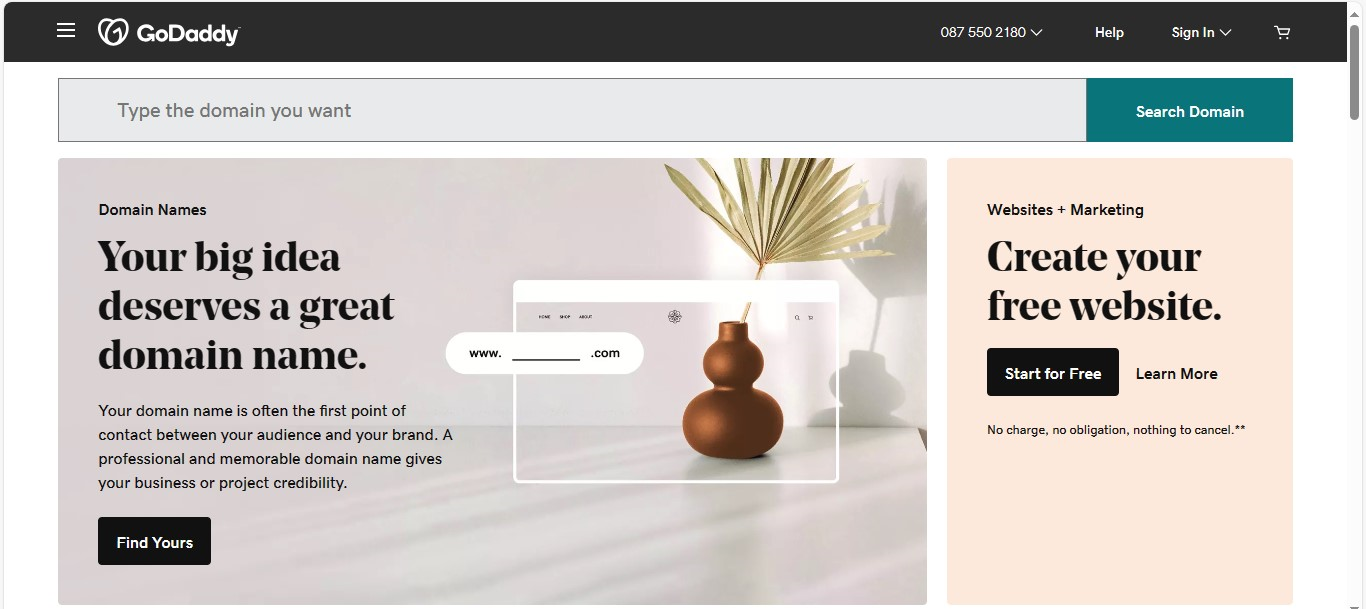
GoDaddy is one of the largest and most popular domain registrars globally. They offer a wide range of services related to domain registration, which include:
- Vast selection of domain names—including common top-level domains (TLDs) like .com, .net, .org, as well as a variety of niche and country-specific TLDs.
- Domain Search Tool—Their platform includes a powerful search tool to help users find and select available domain names, including suggestions for names that are already taken.
- Pricing and Packages—GoDaddy is known for competitive initial pricing on domain registrations, though renewal rates can be higher. They often have special offers and discounts for first-time buyers.
- Domain Transfer—They facilitate the transfer of domains to and from other registrars, making it convenient for users to manage all their domains in one place.
- Domain Management—GoDaddy provides a user-friendly interface for managing your domain settings, including DNS settings, domain forwarding, and setting up subdomains.
- Privacy Protection—They offer privacy protection services to hide your personal information from the public WHOIS database, though this is typically for an additional fee.
GoDaddy’s domain registration service is known for its reliability and wide range of options, making it a popular choice for both individuals and businesses looking to establish an online presence.
- GoDaddy is a big name that has been around for a long time
- They have many services so customers can find their needs in one spot
- With so many choices, new users might get a bit lost
Read our full GoDaddy review to learn more about this registrar.
Hostinger
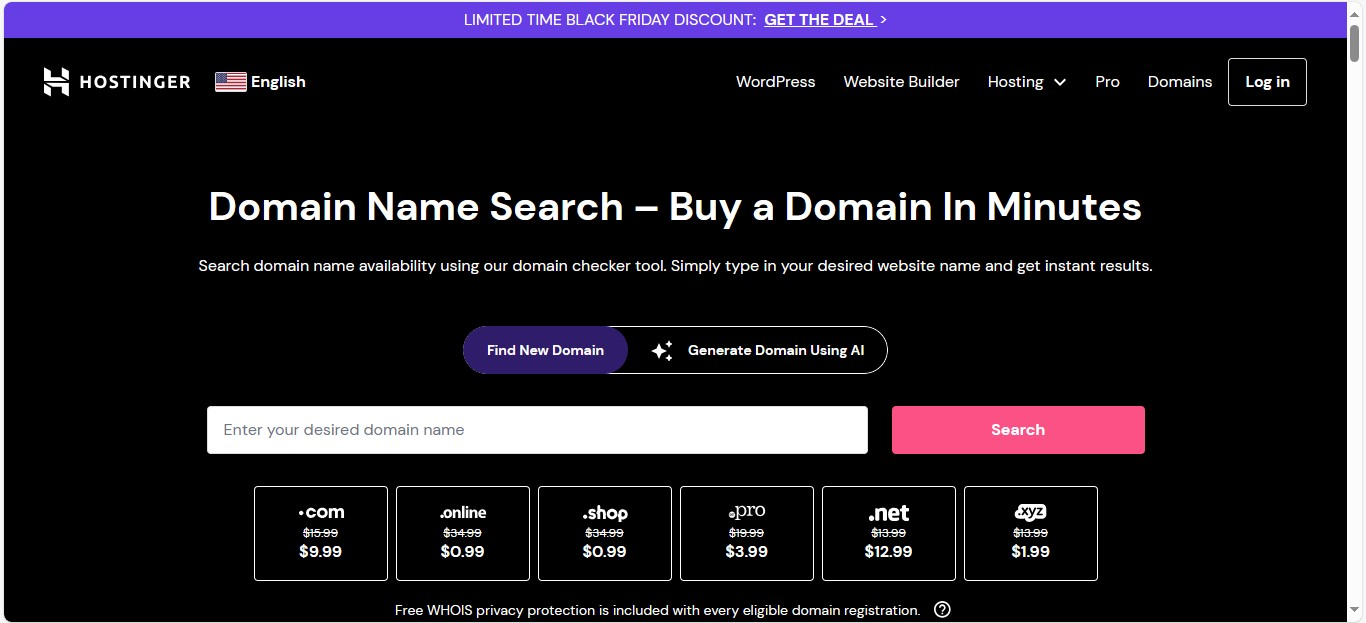
Features: Hostinger helps people get domain names and has good web hosting services.
Pros:
- For those on a budget, Hostinger often has special deals, making it cheaper to get a domain name
- They are known for being a solid web hosting provider
Cons:
- Some of the extra features might cost more
Read our full Hostinger review to learn more about this registrar.
Bluehost
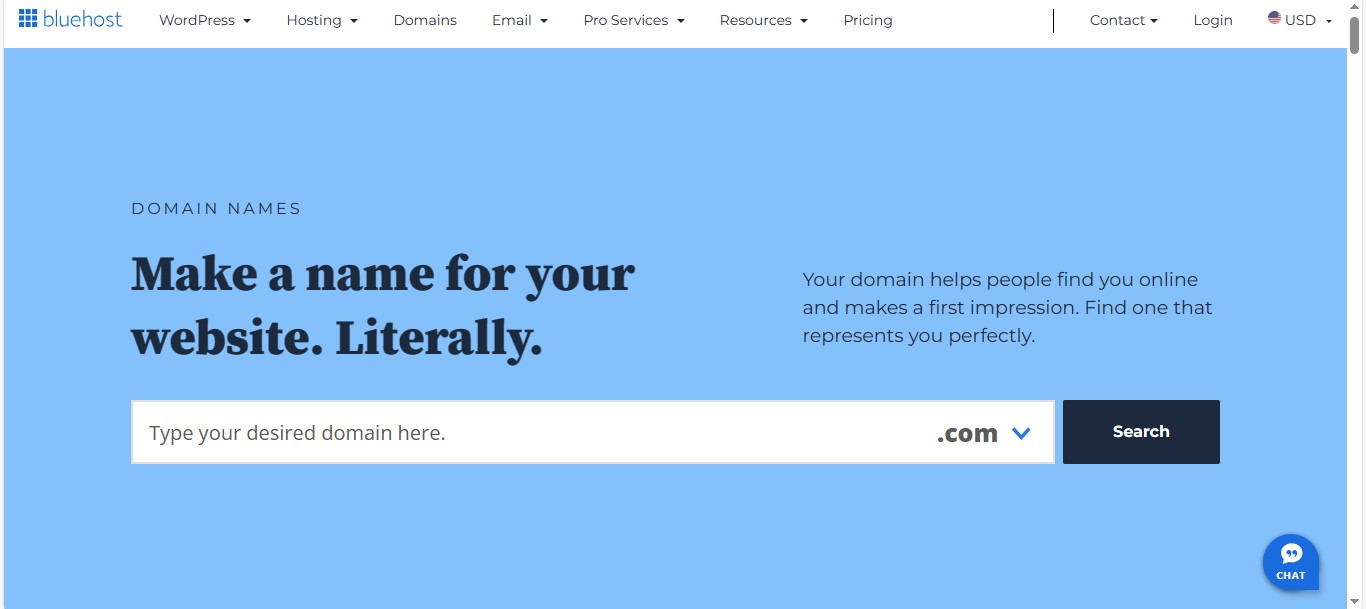
Features: Bluehost is good for getting domain names, especially if you use WordPress for your website.
Pros:
- Bluehost sometimes gives free domain names if you get certain hosting packages
- Their services work well with WordPress
Cons:
- After their special deal ends, prices for services might go up
Read our full Bluehost review to learn more about this registrar.
Namecheap
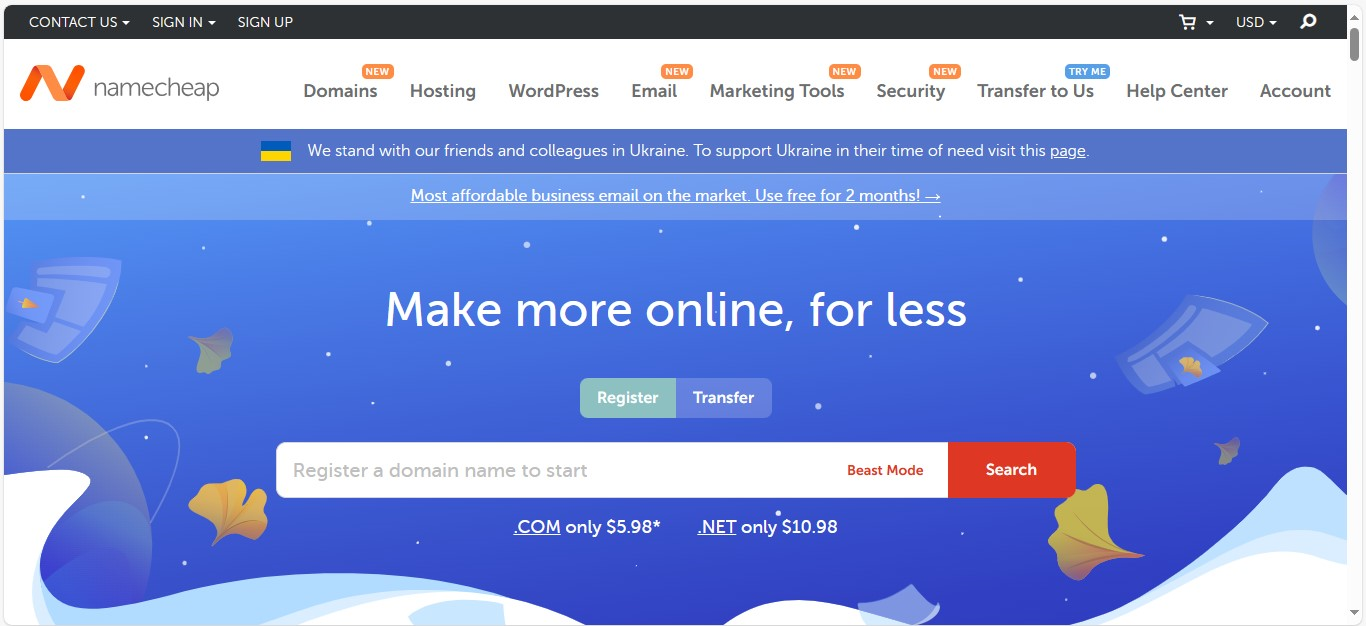
Features: Namecheap mainly helps with getting domain names. They also focus a lot on keeping those domain names safe.
Pros:
- They often have good prices, making it cheaper to get a domain name
- They care about keeping customers’ domain names safe
Cons:
- Some people might find it a bit tricky to use their platform
Read our full Namecheap review to learn more about this registrar.
DreamHost
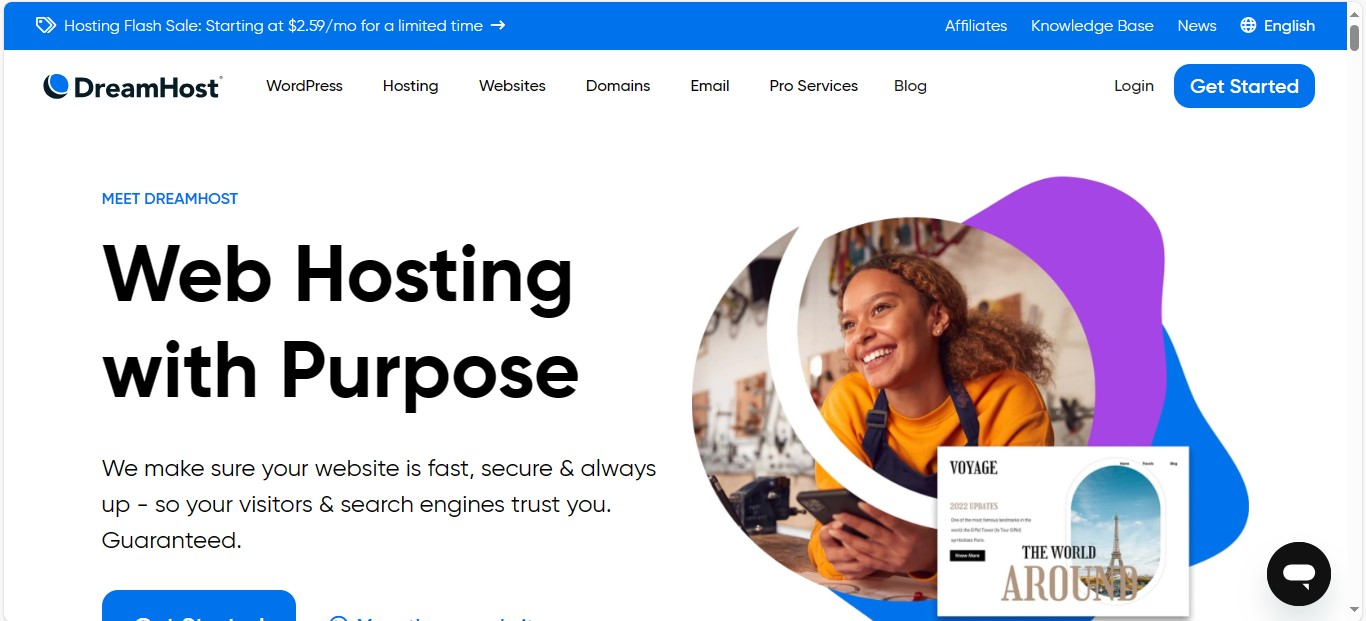
Features: DreamHost has a bunch of services, from helping you get domain names to web hosting and storing stuff online.
Pros:
- They show all their prices upfront, so there are no surprises
- Many people trust DreamHost for their top-notch web hosting services
Cons:
- They have their own tools instead of the usual ones, so some users might need to learn new things
Read our full Dreamhost review to learn more about this registrar.
Does It Matter Where You Buy a Domain Name?
Yes, it does. Similarly, not all domain registrars provide the same features or services. Some might give you a free domain name for a year, while others have better customer support or extra security options such as domain privacy.
So, when you’re diving into domain name registration, where you buy it can make all the difference. Pick a reliable domain registrar and consider the available top-level domains to ensure the success of your right domain project.
How Much Does It Cost to Buy a Domain Name?
The cost of buying a domain name varies depending on the registrar, the domain extension, and whether you are registering a new domain name or renewing an existing one.
Generally, you can expect to pay between $10 and $20 per year for a common extension such as .com, .net, or .org. Some registrars offer free domain names with hosting plans. This can be a good option for users who are creating a new website.
Here’s a chart to give you an overview of what to expect.
| Registrar | Extension | Registration Price | Renewal Price | Transfer Price |
| GoDaddy | .net | $12.99 | $17.99 | $65.00 |
| Hostinger | .net | $2.69 | $9.99 | $79.99 |
| Bluehost | .net | Free* | $14.99 | $79.99 |
| Namecheap | .net | $8.98 | $8.98 | $79.99 |
| DreamHost | .net | $7.99 | $14.99 | $79.99 |
Why Is It So Expensive to Buy a Domain?
You might wonder why some domain names have such hefty price tags when looking at domain registration. Like prime real estate in a bustling city, domain names are unique addresses online. Their prices can vary based on:
- Popularity: Short and catchy domain names often come with a higher cost.
- Domain Extensions: Some domain extensions, like .com or .net, are more sought after and can be pricier than others.
- Unique Appeal: Domains that sound brand-like or are easy to remember might have a steeper price.
So, the more in-demand a domain is, the higher its price.
Read our guide on Buying Cheap Domain Names to find an affordable option for your online business.
Can You Get a Domain Name for Free?
Here’s a little secret: some domain registrars offer free domain names. However, there’s usually a catch.
You might need to purchase another service from them to get that free domain name, like a web hosting plan.
Consider it a special deal – “Buy web hosting, get a domain name free!†So, while you might find offers for a free domain, always check what else you need to commit to.
How to Buy a Domain Name for Free
Getting a domain name without shelling out any cash? Sounds incredible, right? Here’s how you can snag that free domain name:
- Use a Free Subdomain: Web hosting providers often offer free subdomains as part of their services. This means your web address will look something like “yourname.theirdomain.comâ€.
- Pay for a Premium Site Builder Plan: Some site builders reward you with a free domain when you choose their premium plans. Remember, while the domain name is free, you still pay for the builder’s services.
- Pay for a Business Email Service: Similar to site builders; some business email services throw in a free domain name as part of the package.
- Domain Registrar Ad Programs (Not Recommended): Some domain registrars may offer free domains, but in return, they’ll run ads on your site. This can be distracting for visitors.
- Free ccTLD Services (Not Recommended): Certain extensions (like .tk) are offered for free. However, they might not be the best choice for a professional site.
- Almost Free Domain Promotions: Sometimes, domain registrars run promotions where domains cost just a few cents. It’s practically free, but not quite!
- Affiliate Programs: Some domain names can be obtained by joining and promoting a domain registrar’s affiliate program.
Remember, while a free domain sounds great, always check the terms. Sometimes, it’s worth paying a bit for a perfect domain that’ll make all the difference.
Can You Buy a Domain Name Permanently?
Buying a domain name means renting it for a while, not owning it forever. You can pay to have it for up to ten years. Make sure to renew your domain before it runs out, or you might lose it. Some companies remind you to continue and even let you set up auto-renewal.
Select a reliable company for your domain name and consider adding a web hosting package to improve your website’s performance and visibility online.
Different domain endings, such as .com or .net, suit different websites, so choose wisely. Use domain privacy to keep your details safe. A great domain name plays a huge role in boosting your website’s popularity.
Read our guide on How to Register a Domain for As Long as Possible to learn about the steps involved in buying a domain name for a long time.
How Much Does It Cost to Buy a Domain Name for 10 Years?
To answer this question, you have to think about different aspects:
Domain Extension
- .com Domains: These usually cost between $10 to $50 annually. So, for ten years, you would probably pay from $100 to $500.
- Other Extensions (like .net, .org, etc.): These might be cheaper or more expensive; other domain endings, like .net or .org, might cost more or less, depending on their popularity and what deals the seller offers.
Registrar Pricing & Discounts
- Prices can be different depending on where you buy the domain. So, it’s a good idea to look at different places.
- If you buy a domain for many years at once, you can get it cheaper. Namecheap, for example, takes off 30% if you buy for ten years.
Top-Level Domain (TLD) and Registrar Choice
- The price of your domain can vary depending on the type of domain you choose and the place where you decide to buy it.
- Popular domains like .com usually cost more, while others might be less expensive.
When you add it all up, for a .com domain, you might pay anywhere from $100 to $500 over 10 years. Here’s a smart tip: Always watch for deals, especially if you plan to buy the domain for a long time.
How to Buy a Domain Name from Someone
You need to know the right steps to buy a domain someone else owns. Here is a clear and detailed guide to help you through this process.
Step 1: Find and Contact the Owner
- Check if Someone is Using the Domain: First, see if the website is active. A busy website usually means the owner won’t want to sell. But, if the website looks unused, the owner might be willing to talk.
- Get the Owner’s Contact Information: Use the WHOIS directory to find out how to contact them. If their information is private, go to the website and look for a way to get in touch, like a ‘Contact Us’ page.
Step 2: Talk About the Price
- Be Ready to Pay a Fair Amount: Good domains can be expensive. Make sure you are willing to pay what the domain is worth.
- Do Your Homework on Pricing: Look at similar domains and see how much they cost. This helps you make a fair offer. You can also hire a broker to help with the deal, but remember, you must pay them a commission.
Step 3: Pay Safely
- Don’t Use Direct Wire Transfers: Sending money directly can be risky because the seller might take your money and not give you the domain.
- Use an Escrow Service: An escrow service keeps your money safe until you get the domain. This means you only pay when you know everything is as it should be. You must pay a fee, but it keeps your money safe.
In addition to the above, make sure to check the domain’s status, talk openly about the price, and use a safe way to pay to protect your money and get what you want.
How to Connect a Domain Name to Web Hosting
Linking Your Domain Name with Your Web Hosting
Connecting your domain name to your web hosting is like putting up a signpost, directing visitors to your website’s home.
Step 1: Choose a Reliable Web Hosting Service
- Pick a Trustworthy Host: Start by selecting a reliable web hosting provider. Your website’s speed and availability depend on this choice.
- Set Up Your Hosting Account: Once you’ve chosen, set up an account with them. This will be your website’s storage space.
Step 2: Find Your Web Hosting’s DNS Details
- Log Into Your Hosting Account: Access the account you just created.
- Look for DNS Information: In your hosting dashboard, find the section ‘DNS settings’, ‘Nameservers’, or something similar. Here, you’ll see at least two lines of information. These are your hosting’s DNS details. Write them down or copy them; you’ll need them in the next step.
Step 3: Update DNS Settings in Your Domain Registrar
- Go to Your Domain Registrar: This is where you bought your domain name. Log in to your account.
- Navigate to DNS Settings: Find where you can manage your domain’s settings. Look for ‘DNS’, ‘Nameserver’, or ‘DNS Management’.
- Enter Your Hosting’s DNS Details: Now, replace the current DNS information with the DNS details from your hosting account. Save the changes.
The changes take a few minutes to 48 hours to apply globally. During this time, your website might not be accessible. Don’t worry; this is normal.
Once the waiting period ends, type your domain name into a browser to check if your website is live. Everything should work smoothly.
By following these three main steps, you have created a direct link between your unique domain name and your web hosting space, ensuring that when someone types in your domain, they land on your website.
Final Word: Ready to Get Your Domain?
Starting an online project means you need the perfect domain name. Follow our advice, experiment with various names, and choose one that fits well. It’s your online address, so make it count!
Next Steps: What Now?
Now that you’re ready to get a domain name:
- See how to pick a custom domain for your brand
- Get the best web hosting for your website
- Explore the best website builders for great-looking websites
Learn More About Buying Domain Names
- How to Buy a Domain Name that Is Taken in 7 Steps (+ Pro Tips)
- How To Buy Expired Domains and Make Profit
- How to Buy a Domain Name Forever: Is It Possible?
- How Much Does a Domain Name Cost? (& How To Lower The Price)
- How to Check If a Domain Is Available (& 13 Best Domain Name Search Tools)
- How to Choose a Domain Name That Is Right for Your Website
- How to Find a Domain Name Owner with WHOIS Lookup Tool
- How to Price a Domain: From Cost to Profit
- Buying Domain Name from GoDaddy: Step-by-Step Guide
- Buying a Cheap Domain Name: Where & How to Buy One
- I Bought a Domain, Now What? 9 Steps to Take After Purchasing a Domain Name
- How to Renew Domain Name: What to Do When Domain Registration Expires
- WordPress Domain Price: The Ultimate 2024 Cost Guide











